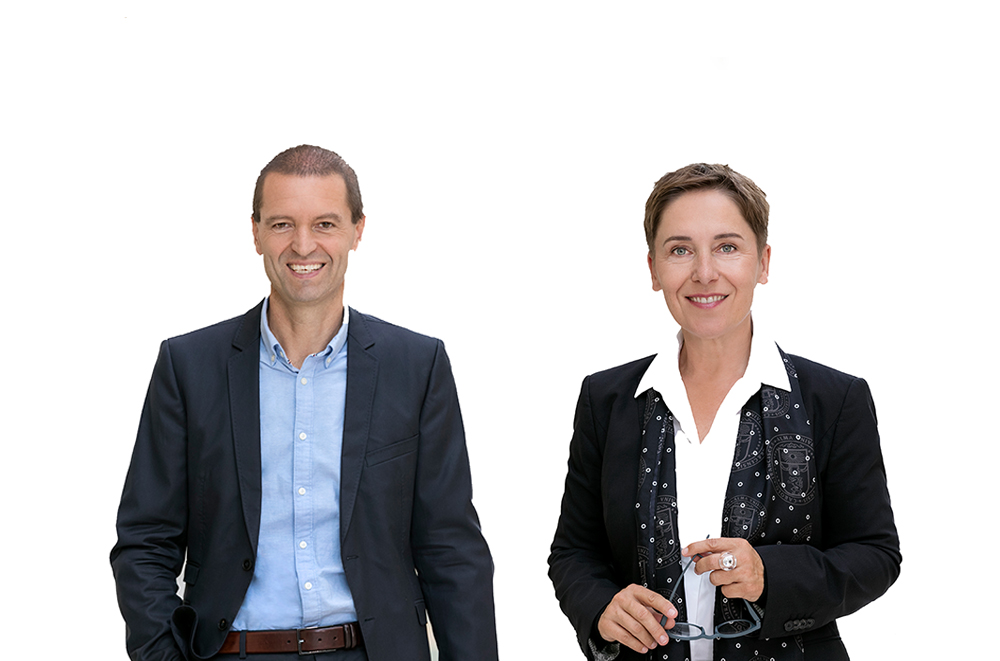The University of Graz is playing in the European league. It was one of the first universities to get on board with the Arqus Alliance in the “European Universities” initiative by the EU. And this drive towards the top continues. Arqus succeeded in raising EU funding in the amount of two million euros for shared research and innovation agendas.
The University of Graz and its six partner universities are joining forces to achieve sustainable changes in society through excellent research. Our university is responsible for the scientific coordination of the “Arqus Research & Innovation” project.
Vice-Rector Petra Schaper-Rinkel, who leads the EU project, and Vice–Rector Christof Gattringer explain what the alliance will bring to science and specifically to the University of Graz.
What are your expectations of Arqus?
Petra Schaper-Rinkel: Our goal is to bring together excellent researchers and teaching staff from the partner universities. We want to build on the variety of disciplinary cultures and diversity in Europe by using basic research to explore the possibilities offered by the digital shift and socio-ecological transformation and contribute to a future Europe. The complexity of these issues required intensive international collaboration. Arqus gives us the opportunity to embody this spirit even more comprehensively. And it’s more than an alliance – it’s about the vision of European universities.
Aside from the national borders, how will it be possible to overcome the cultural and subject-specific differences between the seven universities?
Schaper-Rinkel: This is exactly what the transformational excellence part of the project is about. Because excellence has very different meanings in the various disciplinary and research cultures. If we don’t want to be dependent on a few commercial providers of rankings and ratings, we have to develop consistent criteria for excellence based on the diversity of European science.
Christof Gattringer: On the one hand, there are disciplines, especially in the natural sciences, which cooperate globally as a matter of principle, regardless of their culture. On the other hand, there are disciplines which can be enriched by specific exchanges with other cultures.
How can the recently launched EU project “Arqus Research & Innovation” offer support?
Gattringer: Of course many researchers are well-connected. But usually you collaborate on specific topics in these partnerships. Arqus goes far beyond this. It offers a comprehensive package to coordinate on issues of research, promotion of junior researchers, doctoral schools and the use of infrastructure, among others.
Schaper-Rinkel: With the European universities, we get the opportunity to set up the cooperation in a structural and systematic way. The perspective is that we can all cooperate on a European level in the future – easily and without red tape.
Could Arqus work as an icebreaker, so to speak, for additional and future cooperative initiatives?
Schaper-Rinkel: Together with our Arqus partners, we’re a real-world university laboratory, in a sense. We want to generate a model that has an impact beyond our alliance and creates a shared European research area that we experience as a given. As a project, the alliance is an intermediate step. The goal is European universities in which the partners each have their special history and unique profile, but where students and researchers can move between the locations at least as easily as previously between the universities of a member state.
In the scope of Arqus, the University of Graz is coordinating the action line of research support and the promotion of early career researchers.
Where is this journey heading?
Gattringer: In the last 10 to 15 years, we made great advances in actively improving the quality of our doctoral students’ education. The international element in the form of a study abroad period is firmly anchored in this. With Arqus, we now want to make this more widely and easily accessible.
The common ground is also expressed by the two thematic focal points of the EU project. The focus is on areas where the University of Graz has particular strengths: artificial intelligence and digital transformation as well as climate change. How did this come about?
Schaper-Rinkel: The focus goes back to our university’s initiative. The partner universities joined our proposal. We will now form consortia. As a comprehensive university, we have a high degree of expertise in artificial intelligence and digital transformation; we can analyse the digital shift from a broad perspective that includes the humanities, social studies and cultural studies and can prepare design perspectives together. Arqus increases the chances of acquiring major research projects together on an EU level.
Gattringer: Climate change and digitalisation are central themes in research and society. We are extremely well-positioned with our Wegener Center for Climate and Global Change, which is now also projecting into other areas, and the topic of digital transformation will be actively expanded in our research portfolio in the coming years.
